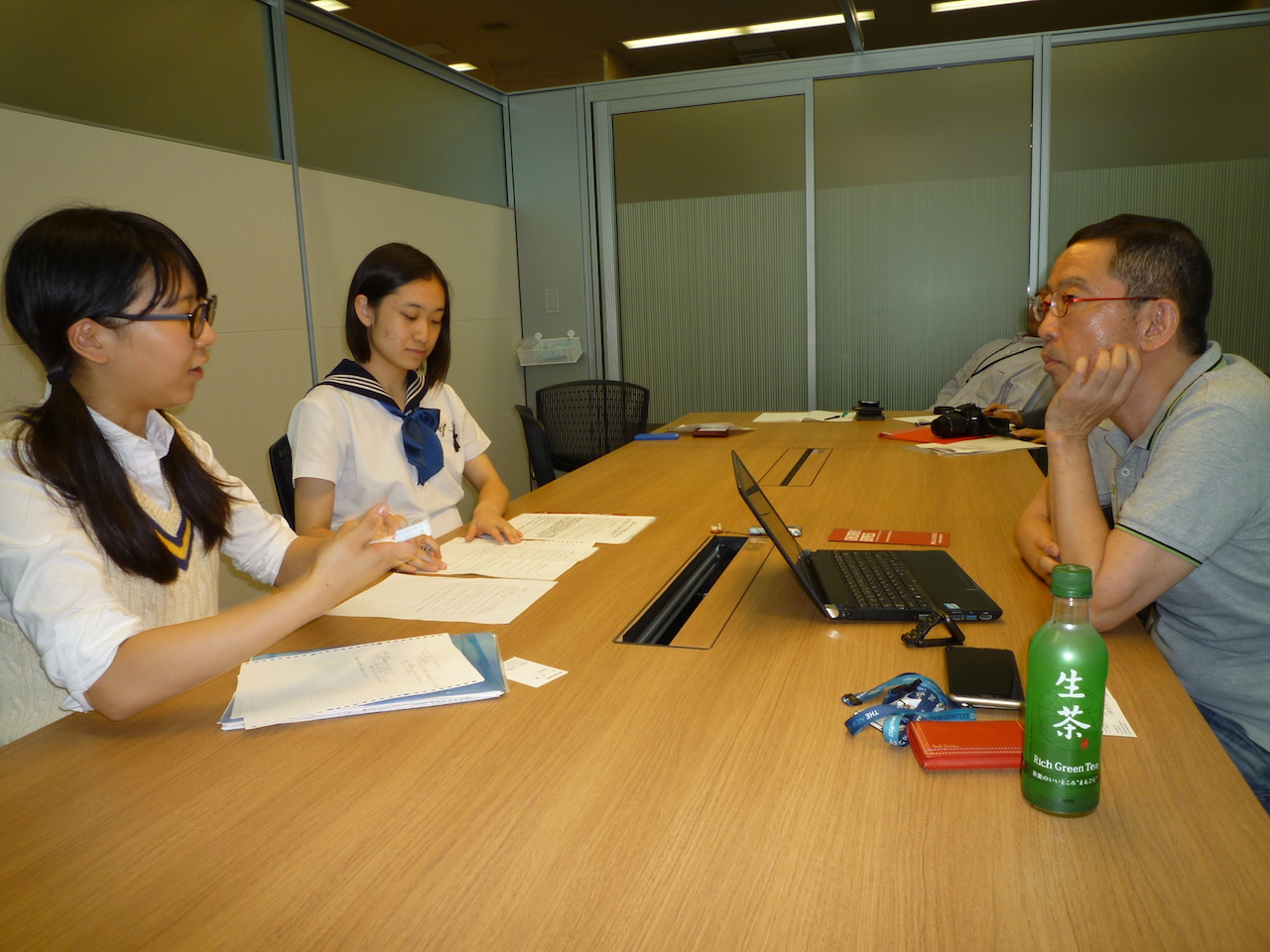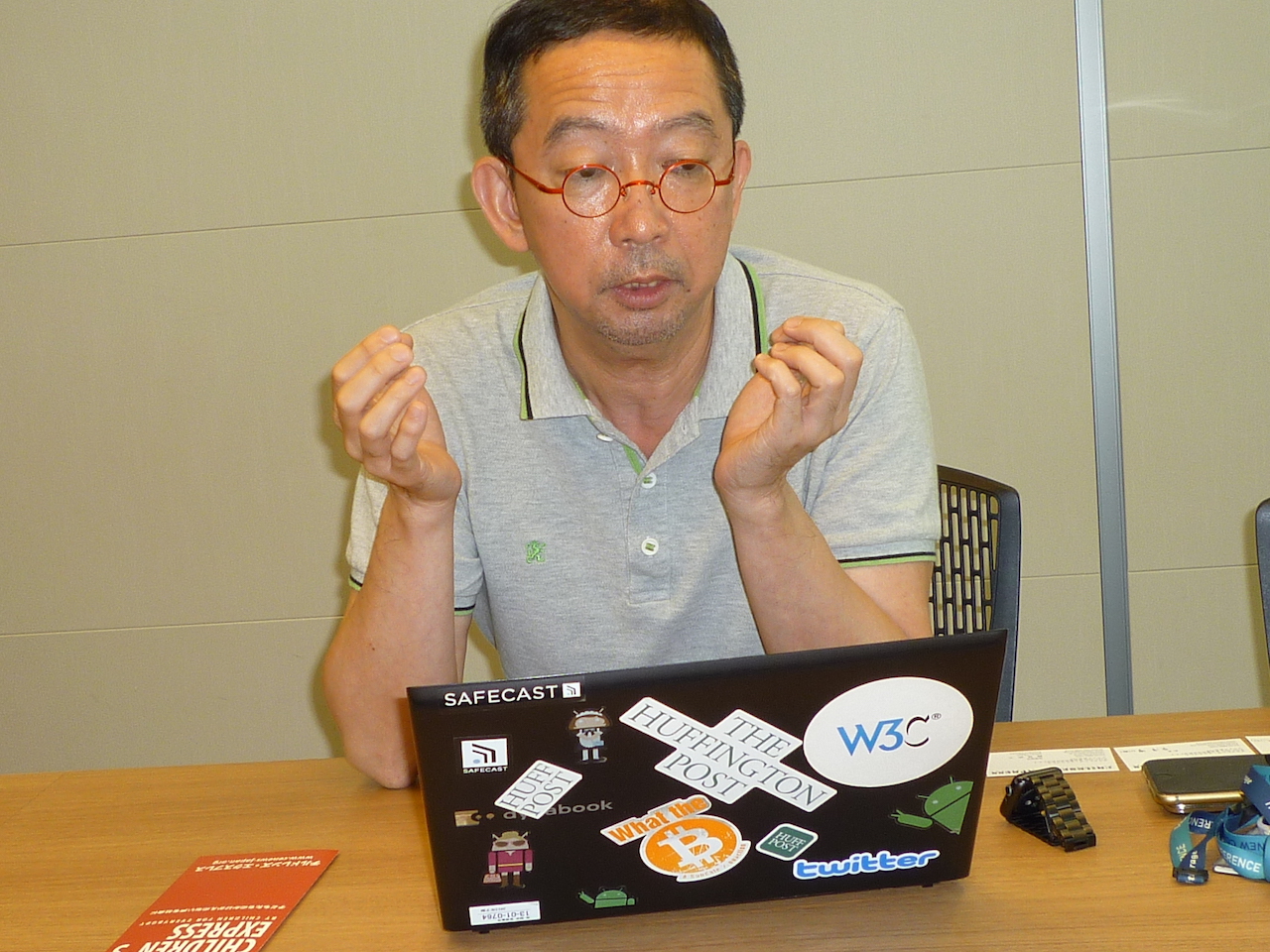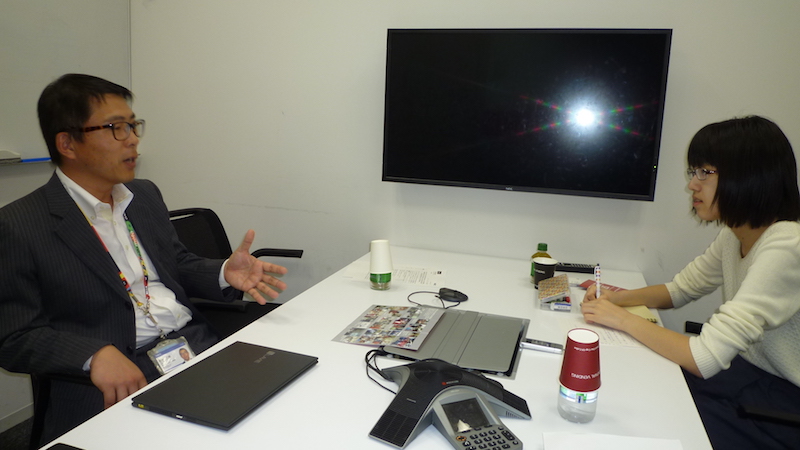Read the article on Youth Express Japan
Ayumi Sudo (17) CE Youth Reporter
Currently, Ayumi was doing an investigative piece on how the number of female politicians can be increased in Japan. While researching, she came upon the system of “parité” introduced in France in 2000 to increase the number of female politicians.
She was amazed by its success, but at the same time, perplexed when she found out that the number of female politicians didn’t increase as much as expected. In order to get a deeper understanding of the current situation of female political empowerment in France, and to find out about future prospects under the Macron administration, she would like to have the opportunity to interview the French Embassy. Fortunately, she could interviewe Sir Laurent Pic, Ambassador Extraordinary and Plenipotentiary of the French Republic on July 19, 2017

Q. Do you believe that it is important to have an equal number of male and female politicians in parliament?

Well, I think that the representation of women in society is very important. It should be natural that half the percentage of the population should be represented in all activities whether that is in parliament or businesses, or public administration. It has been an endeavor for a long time. I know that women have gained a lot of representation in our society in the last few years. For France, women only got the right to vote after the Second World War, so it’s not very old, or very ancient, but the situation has improved a lot since then. Now, what we have found is that letting things happen by themselves doesn’t work, and that we need to have a proactive approach, so, we have set rules in order to improve the representation of women in all spheres and all activities. This is what is happening in France. Political representation is a symbol, and it is very important, and France has, for five years, reached parity in the government, where we have achieved an equal number of male and female ministers. In parliament, we have also been seeking better female representation. Of course, outcomes depend on the electors themselves, when they vote, and also it depends on the parties – who they present as candidates. Now, in our parliament, we have reached a high level of female representation – 223 out of 577 in the National Assembly, which represents 38.8%. Of course, it is an improvement from the past but it is not enough, and so these efforts need to be continued. Once again, each party plays a very important role. For the party which currently has the majority of seats in parliament, which is also the party of the president, female representation is very high – 47%. Parties are starting to put women in electorates where they have high chances of winning. Sometimes parties have been putting women in constituencies where there is no chance of winning, or in proportional systems, they have put women at the bottom of the list, which means that they cannot be elected. So this should be, of course, changed, and this is happening. I can recount what we did in public service, and the administration, where now there are set targets for the percentage of women in higher ranks. There is a law, which is provided for such a system, and in 2017, we have had at least 40% of women appointed for the first time, and the law was under the decision of the previous government. Concerning these posts, which need to go through the Council of Ministers, – if you don’t reach the target of 30% to 40%, you have to pay a fee, and you are fined for not respecting the target. Such decision has considerably improved the situation. For example in the foreign ministry, we have a situation where we have now reached those targets. Everybody was saying at the beginning that it was impossible, because there were not enough women in a position to be promoted or appointed to such level, but in fact, it’s possible, because we did it. Now, we have a lot of female ambassadors, more than before, – it’s around 50, out of approximately 200 posts, which is a big improvement from the past. Of course, it is not enough. When I entered the foreign ministry, there were maximum 10 to 15 female ambassadors, and now it’s 50. So, in approximately 30 years, we have increased the number, but we have to do even better.

Q. As a result of the June elections, a record-breaking number of 223 seats out of 577 in the National Assembly are now held by women. 47% of the LREM’s elected politicians are now women, despite many studies showing that the barriers for women entering politics are higher than that of men. —Why was this historic feat possible?
I think that the barriers that exist are barriers that we are creating ourselves, and if we decide that these barriers are no longer relevant, everything is possible. Women have the same talent as men, and maybe sometimes more. If the promotion system is appropriate, then they can be promoted into the National Assembly or any other form of political activities.
What is important is also to adapt our system to the lives of women, in all spheres of activities. One issue is our work, -what our working patterns are. Can the work be a good system for family life? The children? To adapt, we set rules that are consistent with what is the real life for women. For instance, in the foreign ministry, in our embassy, we have a chart of the time, where we provide a certain number of rules that are beneficial to women, -which is that after certain hours you’re not allowed to organize meetings, which means that women, who have to come back home because they want to take care of their child, are not prevented from exercising their work because they cannot attend those meetings. There is also the right of disconnection, which means that on the weekends, you are not supposed to answer your emails. So, we can organize life so that the working environment is adapted to what a woman’s everyday life is. Of course, there are other changes in our society that needs to be promoted like the fact that children is not an issue only for women, it should also be for men. Men should also take responsibility in this respect. For instance in this embassy we have a couple of diplomats who have just had a child, and the female diplomat took maternity leave, but the father also took paternity leave to raise his child. That is good. It is the right direction.
Q. How did the gender parity laws come into place? Were there any controversies? Were there met with any opposition?
In parliament, there was a big discussion because people want to keep their power, and their posts as an MP, and they see women as a kind of threat to the post that they have been in for a long time, so what is happening at the moment is that there is a big renewal also in parliamentarians. Not only are there more women than before, but also there are more new MPs than before, because there was a big reform that was passed in parliament recently under the previous government so that people cannot accumulate political responsibilities. For example if they are a mayor of a city, they cannot be an MP at the same time. Or a president of a local council, whether it is at the regional level or the level of departments, – basically they have to choose, and that is pushing for the renewal of the members of parliament because a lot of former MPs decided not to stand for reelection, and they decided to choose another responsibility. That is also going into the direction of more gender parity.
And so, each time we want to change the system, there are people who are reluctant, because they see it as a threat to their position. But, if you have political will, I think that we can resist because nobody is really contesting that women are equal to men. I think that a new step forward is to once have a women president in France, like how we have a new young president, which is new for France, and that is a good thing. The next stage would be to allow a woman to be president. Like how in the US, Barack Obama was the first president who was from the black minority. These baby steps are important to promote equality.
But at the same time, you can never stop having strong political will, because you will always have resistance in society –conservatism, and that means that you must have a lot of political will each time to promote equality, in all respects. Not only in gender equality but representation for minorities -Equal rights for all minorities including sexual minorities, for instance. This is a political fact.
Q. Why the 50/50 approach instead of 30% or 40% quotas? Why would you say that the gender parity laws are the best approach?
I’m not sure there is a best approach because each country has to decide by itself.
The objective is that at some stage, we will not need any quota at all – we might have 75% of women in parliament – why not? If they are elected by the people and chosen by the electorate then that’s fine.
But at this stage, the idea is that to promote women, we need to have a quota. So, for us, we decided that 50% is a good quota because it represent the number of women in society. We put women in front, more than men, so it could have been 51 or 52, but it’s a kind of quota and each country has to decide by itself. As I mentioned before, there were also progressive reforms. Several laws have been passed before. The most recent approach is a more radical one, because it really is promoting change, and that is working. But in the end, we don’t have 50% of women in parliament, and that was the decision of the electorate to choose a candidate from one party that was not necessarily a woman.
Q. So is it better to gradually stop focusing on gender?
No, what I am saying is that each country has to decide by itself on how to move forward. In our case, we deemed it appropriate to move forward that way, and it proved to be the right approach because we are getting results. But, in other cases, it might be different, so we don’t want to prescribe for everyone; – we don’t pretend to be an example to be followed. We have done things that way, and it gives such and such result, and for the others, if they want to get inspiration from our system they can do it but if they want to have another system, they are free to do it as well. But the directive should be the same because basically, gender equality is something which is, to some extent a common rule for everyone, based on the UN Development Goals. All of what we have done, all of the UN organizations, are in the trail of equal representation for women, on a political level.
Q. I heard that President Macron wishes to implement some reforms to the electorate. How would such reforms change the electoral process?
What he wants to do, what he has announced recently when he was speaking in front of Congress, which are the two chambers of parliament fitted together in Versailles, is that he wants to make a constitutional reform, and in particular to reduce the number of members of parliament, because he thinks that they are too numerous at this stage. So, yes, he set a target of a one third reduction in the National Assembly, which is the lower chamber of parliament, and the Senate, which is the higher chamber of parliament, and also in the Economic, Social and Environmental Council. So, that is one of the first reforms that he wants to put in place. He also wants to introduce some proportionality in the electorate system, which means that a certain amount of MPs will be elected through a proportional system, and the rest of them will be elected, as it is the case now, by constituency with a majority system. These reforms are to be more specified, but this is the intention. Of course, to carry on as before, we need to check that there is no backtrack in terms of equal rights for women, and equal representation. What is important also is that Mr Macron wants to promote transparency in our political system, which means that the people who are elected need to be more accountable. We have already put in place a higher authority for transparency –when you are elected, you have to make a statement at the beginning of your term, giving details about your income and your property in order to avoid potential conflicts of interest.. So, I think this can also be in favor of women, because it is different from the past. We have to have transparency. This also applies to civil servants. To be an ambassador, for instance, I have to provide a statement in the beginning of my term to show that there are no conflicts of interest and that I am paying my taxes, and so on, so that you will respect the rules like everybody else.
Q. What do you think are the impacts of having an equal number of women in parliament on politics?
I think it makes the country work better because it reflects the reality of the country if you have equal representation. There is also an impact on the laws that are passed, and how they interact with the everyday life of our citizens, so yes. It makes the system more efficient and more relevant also for the people.
Q. So, do they provide more viewpoints and perspectives?
Yes, exactly.
And you know, in a democracy, our systems are based on representation. Worldwide, there is a kind of global criticism against this system. There are some countries which think that, to some extent, democracy is not so relevant, and that we should have a more authoritarian approach. So if you want to fight what we call populism, we have to show that all those criticisms are not true, and that representation is really bringing things to our people. We have to prove that our political system is really answering to the aspirations of the people, and I think that these types of reforms to ensure gender equality are in favor of that. I think it makes it possible for every people in society to feel represented in parliament, and that is very important for the future of our democracies. If we don’t do that, I think that at a certain extent, we will have big problems.
Q. Before this year’s elections, there weren’t as many women in the national assembly, and there are fewer women in the Senate, and this was happening despite the gender parity laws. As you said, parties were putting women in electorates that weren’t really winnable, so do you think that there should be stricter restrictions on parties that don’t value gender equality?
Well, we will see what laws will be passed in the future in order to promote gender equality. All the parties will have to respect the laws. But I think the fact that some parties are doing the job is also an incentive for others to do the same, because if they don’t align, they will lose some voters. So, I think that that is a powerful mean of progress. Using compulsory laws is a possibility. In France we have never been against imposing things, sometimes. But there is also the incentive of what is happening in other parties, which can be quite of a powerful tool as well. Both ways are possible.
I remember two years ago, meeting with a young MP woman. She was a member of parliament elected in 2012, representing French people living abroad and she was in the constituency for the area including the United Kingdom. She was a young woman, less than thirty years old, blonde, and the first time she entered the National Assembly, when the discussions were taking place, she was prevented from entering the main room by the person in charge of controlling the access because he thought that she was an assistant to a member of parliament, not a parliamentarian. So, this means that some people are still completely formatted by the past. I think that things have changed since then and people are getting more used to seeing women as parliamentarians, and that is very good.
This woman became a minister after that. Now, she is not an MP anymore because she lost the election, – that can happen, and you cannot necessarily be elected all the time- but basically, she was a young talented woman and she made her way, and she managed to become a member of parliament.
Q. What do you think about gender inequality, or the problems faced by women in society in general? What problems do you think still remain?

Well, there are a lot of problems for women, I think. Managing work-life and also personal-life, is more difficult for women than men, because people still consider that taking care of children is a matter for women, but that is not the case, it is a matter for both men and women, -there is a father and a mother.
There is also an issue of sexual harassment, which is an issue existing in all countries. What is important in that respect is that, when there is a problem, the woman has the possibility to go to see the police, and tell them what has happened, and have the responsible person prosecuted for what he did, -because usually sexually harassment for women is from men. That is very important. I think that this needs to be accompanied by appropriate laws, which need to be upgraded. I know there was an upgrade of the law in Japan not a long time ago. Basically, the important thing is the possibility of women to say that there is a problem. Because in the past, women never went to the police. They were afraid of being held accountable for what happened, when actually they were the victims, but they were feeling some kind of guilt, and I think that is really unacceptable. So, you should have a legal system, and also appropriate people in police officers that are able to deal with the situations like women in the police that can receive women. All that needs to be organized at the administrative level, at the judicial level, and if you don’t do that, then this is not going forward. This also exists in families, like the sexual harassment of children. It’s a very important problem that should also be addressed.
Basically, there is a whole specter of human activities that should be looked at.
Q. What do you think about the current situation in Japan, concerning gender equality, in comparison to France? Do you see any major similarities or differences?
Well, I think that the similarity is that there is a discussion about gender equality, and that everybody feels that things need to move from the present situation. This is what we have in common. This is not a surprise because, as I mentioned before, these are global objectives recognized by the whole international community and the United Nations system. Everybody needs to ask themselves what to do to promote gender equality. This is also taking place in Japan. I think it is a priority that your government is aiming at.
On the ways to improve the situation and to promote the system, it is up to the Japanese to decide for themselves. I don’t want to make comparisons. We have different cultures, different histories, so we don’t start from the same points of departure. But the objective is the same, so it is important to share objectives and once again, to exchange best practices when they exist, and if we can have that in our dialogue between France and Japan, I think it is very good. We are very open to discussing that with the Japanese society and authorities. As far as the Embassy is concerned, we have also been promoting discussions about that – what we call “intellectual debate”. We are promoting conferences and seminars between our respective specialists and people coming from universities, civil society, NGOs. So, if we can also have more exchange, I think it will be helpful for both of us to compare… but not to compare it in a top-down approach, but a bottom-up one. That is what we are trying to promote here.
So, cooperation is essential?
Yes, of course. We have to learn from one another.




